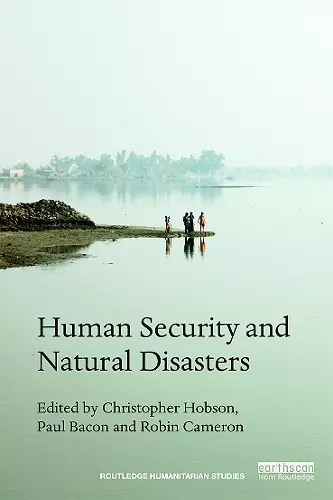Human Security and Natural Disasters
Robin Cameron editor Paul Bacon editor Christopher Hobson editor
Format:Hardback
Publisher:Taylor & Francis Ltd
Published:19th Mar '14
Currently unavailable, and unfortunately no date known when it will be back
This hardback is available in another edition too:
- Paperback£55.99was £55.99(9781138688001)

"Human security" is an approach that rejects the traditional prioritization of state security, and instead identifies the individual as the primary referent of security. It offers a way of broadening our perspective, and recognizing that the most pressing threats to individuals do not come from interstate war, but from the emergencies that affect people every day, such as famine, disease, displacement, civil conflict and environmental degradation. Human security is about people living their lives with dignity, being free from "fear" and "want". To date, there has been a strong tendency to focus on insecurity caused by civil conflict, with less attention on issues to do with environmental security. This volume addresses the threat posed by natural disasters, which represent an increasingly major human security threat to people everywhere.
In looking at natural disasters, this book also refines the human security approach. It does so through developing its previously unexplored interdisciplinary potential. This volume explicitly seeks to bring the human security approach into conversation with contributions from a range of disciplines: development, disaster sociology, gender studies, international law, international relations, philosophy, and public health. Collectively these scholars unpack the "human" element of "natural" disasters. In doing so, an emphasis is placed on how pre-existing vulnerabilities can be gravely worsened, as well as the interconnected nature of human security threats. The book presents a variety of case studies that include the Indian Ocean tsunami, Hurricane Katrina, the 2010 Haiti earthquake, and the 2011 "triple disasters" in Japan.
The human security concept compels us to question prevailing norms and institutions at every level in order to understand why certain individuals and communities fall victim to deprivation and abuse. This excellent collection takes the human security debate forward by focusing upon natural disasters, an area that has been very much under-explored. It is global in outlook and theoretically sophisticated, and it deserves to be read widely for its diverse and authoritative insights.
–Edward Newman, University of Leeds, UK
Freedom from want and freedom from fear, the basic tenets of human security, are never threatened more than when a disaster strikes. At a time when the UN has committed to mainstreaming human security across its policies, this book provides essential insights into how human security can help deal with natural disasters. Rich in their analyses and insightful in their conclusions, the contributions show clearly the potential of human security to shape state responses.
–Matthias C. Kettemann, University of Graz, Austria
A very important book that sheds new light on questions of human security and natural disasters, especially with regard to gender-related issues, public health responses and human rights issues. A wide range of case studies ranging from the Haiti earthquake, Indian Ocean tsunami to Hurricane Katrina bring the reader close to cutting edge critical research on how natural disasters severely affect human security.
–Geoff Wilson, University of Plymouth, UK
This important book, emerging in response to Japan's triple disasters of 2011, draws our attention to the relationship between natural disasters and human security. Aside from illustrating how disasters threaten human security, this volume points to the complex inter-relationship between disasters themselves, the international structural political and economic arrangements that worsen or complicate a response to them, and 'on-the-ground' dynamics of vulnerability, adaptive capacity and resilience within particular communities. This rich set of essays provides one of the more nuanced accounts of a broadened conception of human security, while challenging us to rethink key institutions and practices of 'security' more broadly. As natural disasters increase in intensity and frequency with dynamics of climate change, for example, making sense of how they might be incorporated and approached within current or new institutions will become an ever more urgent enterprise.
–Matt McDonald, The University of Queensland, Australia
ISBN: 9780415737999
Dimensions: unknown
Weight: 550g
210 pages